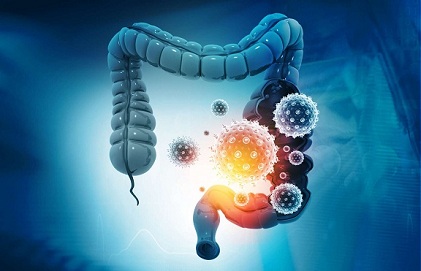COVID-19 Latest: Study Indicates That Individuals With Poor Gut Health Likely To Develop Severity When Infected With The SARS-CoV-2 Coronavirus
Source: COVID-19 Latest Jan 12, 2021 4 years, 3 months, 2 weeks, 8 hours, 31 minutes ago
COVID-19 Latest: A new study by the Korea University led by microbiologist Heenam Stanley Kim Ph.D, from Division of Biosystems & Biomedical Sciences has found that individuals with poor gut health likely to develop severity when infected with the SARS-CoV-2 coronavirus.

COVID-19, which has been declared a pandemic, has exhibited a wide range of severity worldwide. Although this global variation is largely affected by socio-medical situations in each country, there is also high individual-level variation attributable to elderliness and certain underlying medical conditions, including high blood pressure, diabetes, and obesity. As both elderliness and the aforementioned chronic conditions are often associated with an altered gut microbiota, resulting in disrupted gut barrier integrity, and gut symptoms have consistently been associated with more severe illness in COVID-19 patients, it is possible that dysfunction of the gut as a whole influences COVID-19 severity.
This study summarizes the accumulating evidence that supports the hypothesis that an altered gut microbiota and its associated leaky gut may contribute to the onset of gastrointestinal symptoms and occasionally to additional multiorgan complications that may lead to severe illness by allowing leakage of the causative coronavirus into the circulatory system.
The study findings are published in the peer reviewed journal: mBio.
https://mbio.asm.org/content/12/1/e03022-20
Individuals infected with COVID-19 experience a wide range of symptoms and severities, the most commonly reported including high fevers and respiratory problems. However, autopsy and other studies have also revealed that the infection can affect the liver, kidney, heart, spleen—and even the gastrointestinal tract. A sizeable fraction of patients hospitalized with breathing problems also have diarrhea, nausea and vomiting, suggesting that when the virus does get involved in the GI tract it increases the severity of the disease.
Kim examined emerging evidence suggesting that poor gut health adversely affects COVID-19 prognosis.
Based on his analysis, Kim proposed that gut dysfunction and its associated leaky gut may exacerbate the severity of infection by enabling the virus to access the surface of the digestive tract and internal organs. These organs are vulnerable to infection because they have widespread ACE2 ie a protein target of SARS-CoV-2 on the surface.
Km told Thailand Medical News, "There seems to be a clear connection between the altered gut microbiome and severe COVID-19."
Previous studies have demonstrated that individuals with underlying medical conditions including high blood pressure, diabetes and obesity face a higher risk of severe COVID-19.
Risk also increases with age, with older adults most vulnerable to the most serious complications and likelihood of hospitalization. But both of these factors ie advanced age and chronic conditions have a well-known association with an altered gut microbiota. This imbalance can affect gut barrier integrity, Kim noted, which can allow pathogens and pathobionts easier access to cells in the intestinal lining.
To date
the link between gut health and COVID-19 prognosis hasn't been empirically demonstrated, Kim noted. Some researchers have argued, he said, that unhealthy gut microbiomes may be an underlying reason for why some people have such severe infections.
A previous study on symptomatic COVID-19 patients in Singapore, for example, found that about half had a detectable level of the coronavirus in fecal tests but only about half of those experienced GI symptoms. That study suggests that even if SARS-CoV-2 reaches the GI tract, it may not cause problems. Kim also noted that a person's gut health at the time of infection may be critical for symptom development.
Also many recent studies have found reduced bacterial diversity in gut samples collected from COVID-19 patients, compared to samples from healthy people.
The COVID-19 disease has also been linked to a depletion of beneficial bacterial species and the enrichment of pathogenic ones. A similar imbalance has been associated with influenza A infection, though the 2 viruses differ in how they change the overall microbial composition.
Interestingly the depleted bacterial species associated with COVID-19 infection include some families that are responsible for producing butyrate, a short-chain fatty acid, which plays a pivotal role in gut health by reinforcing gut-barrier function.
The microbiologist said that he started analyzing the studies after realizing that wealthy countries with a good medical infrastructure including the United States and nations in Western Europe were among the hardest hit by the virus.
He said, “
The western diet that's common in these countries is low in fiber, and a fiber-deficient diet is one of the main causes of altered gut microbiomes, and such gut microbiome dysbiosis leads to chronic diseases."
The detailed pathogenesis of COVID-19 is still not fully understood. If future studies do show that gut health affects COVID-19 prognosis, Kim argued, then clinicians and researchers should exploit that connection for better strategies aimed at preventing and managing the disease. Eating more fiber, he said, may lower a person's risk of serious disease. And fecal microbiota transplantation might be a treatment worth considering for patients with the worst cases of COVID-19.
Importantly the problem with gut health goes beyond COVID-19, though, he said. Once the pandemic passes, the world will still have to reckon with chronic diseases and other problems associated with poor gut health.
Kin stressed, "The whole world is suffering from this COVID-19 pandemic but what most individuals do not realize is that the pandemic of damaged gut microbiomes is far more serious now."
Read also about how probiotics can help in COVID-19 especially as a prophylaxis and how SARS-CoV-2 infections alters the gut microbiome balance.
https://www.thailandmedical.news/news/emerging-studies-showing-role-of-gut-microbiome-in-covid-19-and-benefits-of-probiotics-for-treatments-and-as-prophylactics-
https://www.thailandmedical.news/news/gut-microbiome-composition-possibly-altered-by-sars-cov-2-resulting-in-increase-of-il-18,-a-pro-inflammatory-cytokine-in-covid-19-patients
Please help support to sustain this website and also all our research initiatives by kindly and generously making a donation.
https://www.thailandmedical.news/p/sponsorship
For more
COVID-19 Latest, keep on logging to Thailand Medical News
